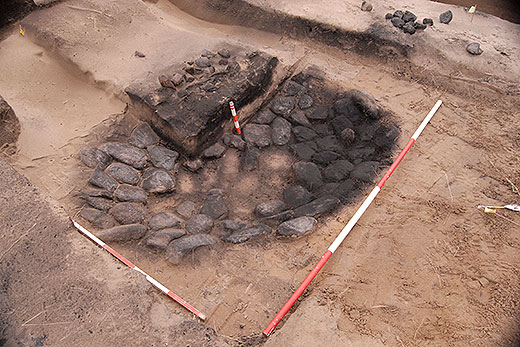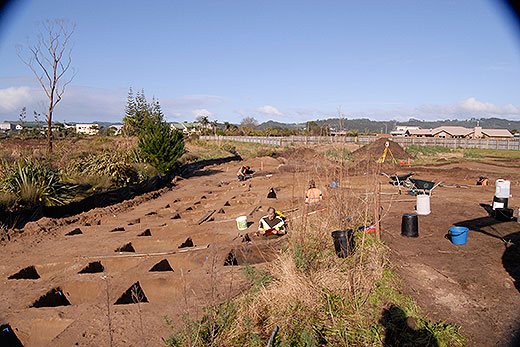An early Polynesian settlement dating back to the early 13th Century unearthed by archaeologists just out of Whitianga is being called a nationally significant find.
Archaeologist Andrew Hoffman, who led four others, spent eight weeks excavating a site near Taputapuatea stream in partnership with Heritage New Zealand, the nearby Pacific Estate subdivision and Ngati Hei.
The archaeology crew working adjacent Taputapuatea Stream, near Whitianga. Photo courtesy of Andrew Hoffman.

The stone-lined earth oven uncovered by archaeologist Andrew Hoffman and his team at Taputapuatea Stream, near Whitianga. Photo courtesy of Andrew Hoffman.
Andrew says the site, which is located below Te Wahine Moeroa o Taputaputea Pa, dates back to the 1350-1450 and offers a rare glimpse into what life was like for Polynesian explorers who were utilising the land to live but also venture round New Zealand.
Evidence found includes a workshop-type area with tools for building and repairing waka – possibly to further explorations – and cooking and gardening areas.
Among many artefacts unearthed is an impressive stone-lined hangi earth oven – possibly for cooking moa or seals – and moa bones used for fish hooks, and basalt and chert rock tools.
Andrew says the oven is rare find and certainly part of the early period of activity on the riverbank, being quite similar to that found at famous archaeology site the Wairau Bar, at the top of the South Island.
'This oven may have been used for cooking something like a moa or perhaps seals. We found they were probably cooking seals or other types of marine animals as it was very fatty.
The discovery of basalt and chert rock tools – such as adzes – shows types of stone they used as part of daily life, including building and repairing waka.
'You could class it as a sort of workshop area,” says Andrew, whosays it's likely the settlement was temporary – as opposed to permanent – because of the mobility of people with ocean-voyaging waka, seeing them constantly on the move.
Drill points, made of basalt or chert, were used to drill through moa in process of making fish hooks. 'We found evidence of use of moa bone for fish hooks.”
Andrew says the East Polynesians possibly settled here while discovering the rest of New Zealand.
'It's the remains of the people that were first exploring the land and living on it, exploiting what's here to survive – and build the population up to establish themselves on the land.”
Adzes would also most probably have been used to ring-barking trees, as part of cleaning land, and for gardening crops such as kumara, yam and taro.
Andrew says the name Taputapuatea is held in tradition to have links back to Taputapuatea Marae on the coast of Raiatea, Tahiti – the ancestral and spiritual homeland of the waka- voyaging ancestors who crossed the Pacific and established themselves in Aotearoa.
Whitianga's original place name is Te Whitianga a Kupe – meaning Kupe's crossing place – as the great Polynesian explorer is said to have voyaged to Aotearoa from Hawaiki and bathed in the hot springs of Whitianga after he moored his waka in Mercury Bay.
It is said Kupe named Taputapuatea Stream and pa after the Tahitian Taputapuatea marae because of its similar natural flora and fauna.
'And the site itself is very old – it's definitely an old site within the first century,” says Andrew.
'There are other early sites along the Coromandel Peninsula and all over coastline of NZ but it's the earliest site that we've got good archaeological evidence from Mercury Bay.”
Andrew says analysis of the evidence found is yet to be undertaken.
Experts will now analyse the remains and samples recovered, including charcoal from fires and environmental evidence of pollen and starch, and stone tools, to put together a chronology of what was happening over time.
'It's nationally significant site in that it's one of a number of the early sites, which as land is being developed will disappear it's a finite resource,” says Andrew.
'So each of those sites offer an opportunity to explore what the lifestyle of the early settlers of New Zealand was like, and what sort of activity undertook and what sort of use of the landscape they were making.”



5 comments
1350-1450
Posted on 09-08-2014 13:59 | By Capt_Kaveman
this date will be interesting to prove
Kavey
Posted on 09-08-2014 15:29 | By GreertonBoy
It is amazing what pollen, starches and charcoal can tell the boffins that know.... these archaeologists don't just pull numbers out of their bottoms, not only do they have us yobbo's critiquing them, they have their peers ready to accuse them of anything untoward they can think of, just to stir poop. If they are confident enough to offer an approximate date, I guarantee you they will have proof. Don't you watch 'time team'?
@GreertonBoy
Posted on 09-08-2014 19:05 | By morepork
OK, but which is it? First century (before Kupe) and at the time of Christ, or 1340 - 1350, around the date of the arguable "Great Migration"? It's a very interesting site either way, but I found this article confusing regarding dates.
1350-1400
Posted on 09-08-2014 20:05 | By Crash test dummies
So that's 1400, Maori, were not in NZ th then, 7 is now 8 cultures pre Maori.
Wise Chief
Posted on 10-08-2014 10:18 | By Wise Chief
Carbon Dating is well proven to be full of errors and I can state matter of factly MY ancestors arrived here a and well before the time of Jesus Our Lord & Saviour. How do I know this you may ask. Well I like most people have been educated by the so called lying colonialists who have for those who ''know'' construed the facts of history to present themselves as some superior class of human them being deramally pale and all to set themselves supposedly above the incumbents who arrived way before them. This constant near monthly effort to reduce the date of arrival of the Maori designed to present and maintain the lie to all who would take the time to do REAL historical research accross all cultures worldwide to find the REAL TRUTH of their arrival 5000+ years ago
Leave a Comment
You must be logged in to make a comment.